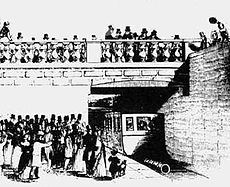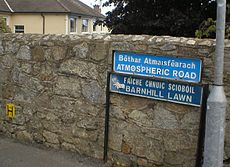- Dalkey Atmospheric Railway
-
The Dalkey Atmospheric Railway (Unofficial opening 19 August 1843, official opening 29 March 1844 - 12 April 1854[1]) was an extension of the Dublin and Kingstown Railway to Atmospheric Road in Dalkey, Co. Dublin, Ireland. It used part of the Dalkey Quarry industrial tramway, which was earlier used for the construction of Kingstown (Dún Laoghaire) Harbour. It was both the first and the longest operating railway of its type in the world.
The standard gauge line was 9,200 feet (2,800 m) in length with an average uphill gradient of about 1 in 110. Vacuum power via a 15-inch (380 mm) pipe was used for the ascent to Dalkey, speeds of up to 40 mph (64 km/h) being achieved, and the return journey was by means of gravity. The vacuum tube fell short of the Dalkey station, and the train relied on momentum for the last stretch of the journey[2].
William Dargan was the contractor and Charles Vignoles the engineer. The atmospheric equipment was supplied by Samuel Clegg and Jacob and Joseph Samuda.
After closure, the line was converted to the Irish standard gauge of 5 feet 3 inches (1600 mm.) A section of the path of the line now forms part of the DART route. The last 200 metres, or so, at the Dalkey end ran slightly to the North of the present line and is now derelict or built over. The bridge which carried Castle Park Road over the Atmospheric railway is still in existence and everyday use. The pumping station was sited in the grounds of a house which still stands beside the path called 'The Metals' adjacent to Barnhill Road
See also
References
Categories:- Dalkey
- Transport in County Dublin
- Dún Laoghaire
- Closed railways in Ireland
- Pneumatics
Wikimedia Foundation. 2010.


